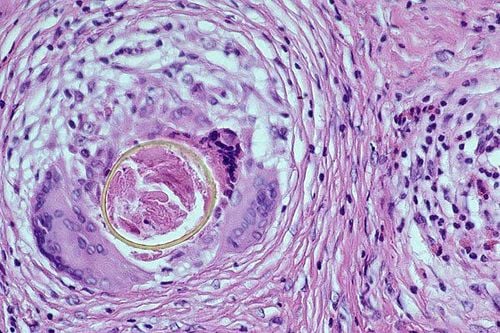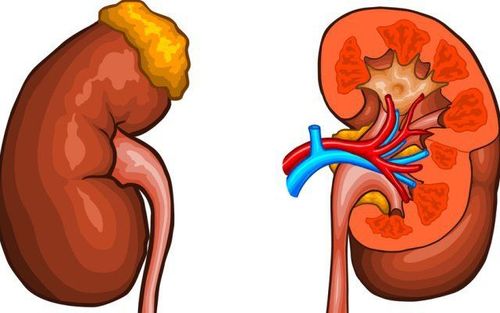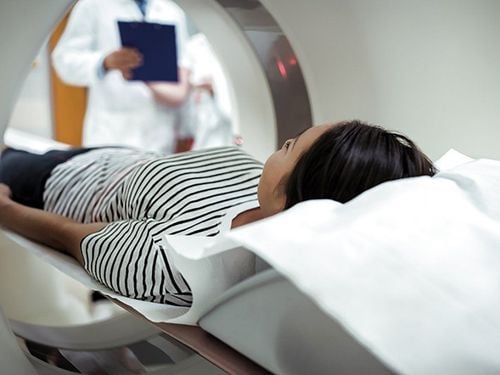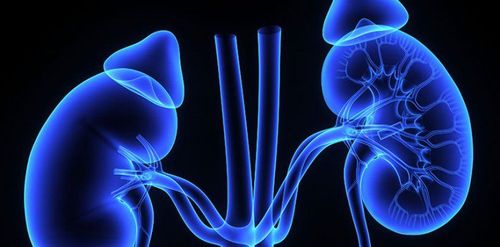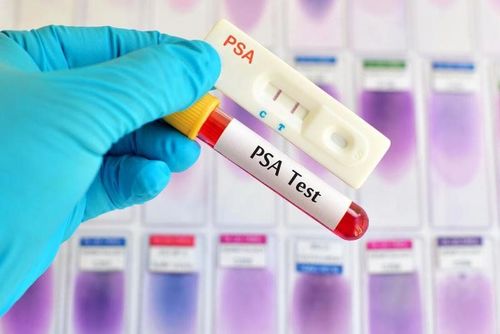This is an automatically translated article.
Adrenal cancer often originates from many different factors such as genetic syndromes, unhealthy lifestyle or exposure to carcinogens,... Currently, adrenalectomy is preferred choice for patients with this cancer. In addition, patients can also be treated with other methods such as radiation therapy, drugs or chemotherapy, ... based on the specific assessment of the doctor.
1. What is adrenal cancer?
Adrenal cancer is a tumor that arises directly from the adrenal cortex and is often detected through CT scans. This cancer often causes symptoms such as weight gain, early puberty in children, water retention or excessive facial hair growth in females due to the large production of hormones. As the tumor grows, it can cause symptoms such as pain or increased satiety due to pressure on other organs. Malignant adrenal cancer can arise from cancer cells that have spread from other parts of the body to the adrenal glands through the bloodstream. In addition, several other types of cancer can also metastasize to the adrenal glands, including lung cancer, melanoma, and breast cancer.2. Where does adrenal cancer originate?
Adrenal cancer is rare, most of which are benign tumors. This cancer mainly affects women, middle-aged and elderly people. Here are some risk factors for adrenal cancer, including:
Having inherited syndromes, such as Beckwith-Wiedmann syndrome, Li Fraumeni syndrome, hereditary non-infectious colorectal cancer hereditary, multiple endocrine neoplasia, and familial adenomatous polyposis. High-fat diet. Smoke. Sedentary lifestyle. Exposure to chemicals that cause cancer.
3. Spot the signs that help recognize adrenal cancer
Symptoms and signs of adrenal cancer will depend on the type of steroid excess produced, specifically:
Aldosterone: Excess of this hormone leads to Conn's syndrome (primary hyperaldosteronism). This syndrome commonly occurs with pituitary adenomas, both in adrenocortical hyperplasia (overgrowth of normal adrenocortical tissue) and in adrenocortical cancer. Symptoms of Conn syndrome include high blood pressure, low renin and potassium levels, weakness, increased thirst, muscle cramps, and increased frequency of urination. Cortisol: An excess of this hormone leads to Cushing's syndrome – the result of an overproduction of ACTH (the hormone that stimulates the adrenal glands to produce cortisol). In addition, Cushing's syndrome can also occur in patients who are taking steroid medications for other disorders. Symptoms of Cushing's syndrome include fluid retention causing facial edema, weight gain, red/purple stretch marks, infection, mental changes, fat accumulation behind the neck and shoulders, precocious puberty, psychosis. Sex hormones: When there is an excess of testosterone, patients with adrenal cancer will have an increased risk of virilization occurring in both men and women. This leads to masculine features such as hair loss, deepening of the voice, and increased clitoris size in women. Conversely, feminization can occur in men when there is excess production of estrogen, causing sexual impotence and gynecomastia. As an adrenal tumor grows, it can affect other organs by putting pressure on them and giving rise to symptoms. Patients with large adrenal tumors often experience localized pain or fullness in the abdomen, sometimes feeling fullness or weight loss. In many cases, the tumor is so large that the patient can feel it in the abdomen.
4. Diagnostic tests for adrenal cancer
Adrenal cancer is usually diagnosed when symptoms develop due to the cancer overproducing hormones. Patients with Cushing's syndrome may experience problems in the pituitary gland, adrenal glands, or elsewhere in the body. Therefore, the first step in diagnosis is to measure 24-hour urinary cortisol levels.For patients with aldosterone levels in excess of the permissible level, a blood test for renin levels should be performed. In cases of hyperaldosteronism due to adrenal cancer, very low renin levels will be noticed. Conversely, if the patient has renal artery stenosis, there will be high levels of renin in the blood.
Some other diagnostic methods for adrenal cancer, including:
CT scan, CAT helps create 3D images inside the body, detect adrenal cancer when the tumor is > 6cm. In addition, CT scans also help differentiate between adrenal hyperplasia and normal adrenal glands. Ultrasound and MRI, although less commonly used, can still diagnose adrenal cancer. Ultrasound helps find tumors larger than 3cm and distinguishes well between adenomas and cancers. Meanwhile, an MRI scan helps determine if the tumor is cancerous. Diagnosis by biopsy, however, is not recommended because it can increase the likelihood of tumor cells spreading and causing cancer metastasis. Ideally, patients should be diagnosed with imaging tests and hormonal studies.
5. Adrenal cancer treatment by adrenalectomy
The only way to cure adrenal cancer is to have an adrenalectomy that completely removes the tumor. This procedure is also known as adrenalectomy or adnexectomy. For patients whose tumors have metastasized or grown to other organs, complete surgical resection of the tumor is not feasible.
In adrenalectomy, the entire kidney on the same side as the adrenal tumor is removed. The most common form of surgery applied today is laparoscopic with advanced techniques. Sometimes adrenal cancer can grow into a large blood vessel that carries blood from the lower body back to the heart (the vena cava). Even in this case, an adrenalectomy can still be performed, however the involvement of a general surgeon, a vascular surgeon, and a urologist is required.
The goal of surgery is to remove as much of the tumor as possible (for cases where complete removal is not possible) to help improve symptoms, especially when the underlying cause is excessive secretions steroids. In addition, the doctor can also decide if the patient needs radiation or chemotherapy before/after surgery. This treatment option will depend on the size of the tumor, how far it has spread, and the success rate of the adrenalectomy.
Even so, adrenal surgery can carry certain risks for the patient, including:
Development of blood clots (deep vein thrombosis or pulmonary embolism). Wound infection. Bleed. Lung infection. Intestinal cage. Damage to blood vessels or surrounding organs. The hospital stay after adrenalectomy will last from 3 to 5 days. A patient's recovery can take about 2 to 6 weeks. Here are the doctors' advice for adrenal cancer patients after surgery:
Avoid lifting heavy objects for 6 weeks. Avoid vigorous activity for 4 weeks. Avoid driving while using narcotic pain relievers. Avoid bathing for 2 days after surgery. Do not soak, swim for 1-2 weeks.
6. Some other treatment options for adrenal cancer
In addition to surgery, patients with adrenal cancer can also be treated with other methods such as:
Radiation therapy: Kills cancer-causing cells with high-energy X-rays. Radiation therapy is often used in cases where surgery does not completely remove the tumor or the cancer recurs after adrenalectomy. In addition, it is also considered a palliative treatment, helping to control pain symptoms caused by cancer. Chemotherapy: Using different chemical drugs to kill cancer cells, such as Mitotane, Doxorubicin, Etoposide, Streptozocin, and Cisplatin. These drugs can be used alone or in combination with 2 or more drugs to increase the effectiveness of cancer treatment. Use of other medications: Symptoms caused by hormone levels that are too high or too low in patients with adrenal cancer can also be relieved with medications such as Metyrapone, Ketoconazole, Spironolactone, Mifepristone, Toremifene, Fulvestrant and Tamoxifen. Vinmec International General Hospital is one of the hospitals that not only ensures professional quality with a team of leading doctors, modern equipment and technology, but also stands out for its examination and consulting services. and comprehensive, professional medical treatment; civilized, polite, safe and sterile medical examination and treatment space.
Please dial HOTLINE for more information or register for an appointment HERE. Download MyVinmec app to make appointments faster and to manage your bookings easily.




